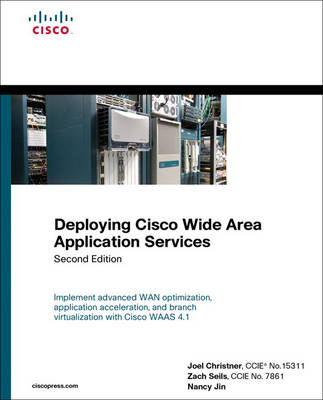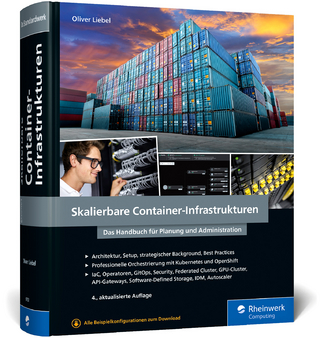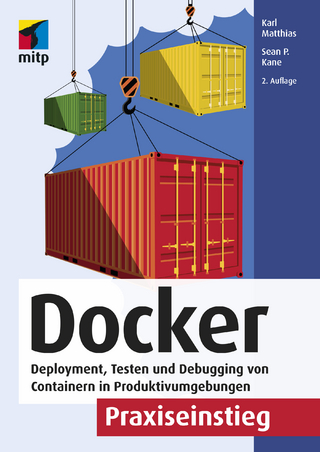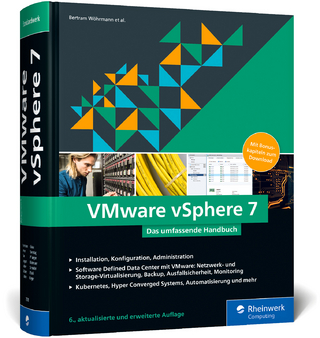
Deploying Cisco Wide Area Application Services
Cisco Press (Verlag)
978-1-58705-912-4 (ISBN)
- Titel ist leider vergriffen;
keine Neuauflage - Artikel merken
This book brings together all the information you need to design and deploy scalable, transparent application acceleration, WAN optimization, and branch virtualization solutions with dramatically improved Wide Area Application Services (WAAS) 4.1 products from Cisco®.
Cisco WAAS insiders Joel Christner, Zach Seils, and Nancy Jin systematically cover new WAAS software enhancements that enable far better performance, simplified workflow, and improved manageability. They introduce powerful new solution components including application-specific acceleration techniques, hardware form factors, and virtualization. They also thoroughly explain recent architectural improvements that provide a solid foundation for future WAAS solutions.
The authors begin by reviewing the underlying technologies that comprise today’s Cisco WAAS solution. Next, drawing on extensive personal experience, they walk through collecting requirements, designing effective solutions, integrating WAAS into existing networks, and configuring WAAS 4.1 software.
This book is replete with real-world implementation examples and case studies– including extensive coverage of network, branch office, and data center integration. One step at a time, you’ll learn how to deploy Cisco WAAS in a scalable, transparent, and seamless fashion: one that addresses both your business and technical challenges.
Thoroughly understand WAAS 4.1’s capabilities, and learn how to use and manage it effectively
Understand both the Cisco WAAS appliance and router-integrated network module hardware family
Quickly deploy WAAS in lab or production pilot environments to quantify its potential benefits
Size, design, and deploy Cisco WAAS for maximum performance and value in your enterprise network
Compare and select design options for branch office and data center network integration
Deploy the WAAS Central Manager and accelerator WAAS devices
Implement centralized authentication, authorization, alarm management, monitoring, and reporting
Configure WAN optimization with the Application Traffic Policy Manager
Configure, verify, and manage application acceleration
Leverage WAAS 4.1’s powerful new branch office virtualization capabilities
Quickly troubleshoot WAAS problems using Cisco’s own best practices
This book is part of the Networking Technology Series from Cisco Press®, which offers networking professionals valuable information for constructing efficient networks, understanding new technologies, and building successful careers.
Joel Christner, CCIE No. 15311, is a distinguished engineer at StorSimple, Inc. Before StorSimple, Joel was a technical leader in the Application Delivery Business Unit (ADBU) at Cisco Systems, Inc., driving the long-term product strategy, system architecture, and solution architecture for the Cisco Wide Area Application Services (WAAS) product and the Cisco broader application delivery solution. Previously, Joel was director of product management for Reconnex Corporation (acquired by McAfee), the industry leader in data loss prevention (DLP) solutions. Prior to joining Reconnex, Joel was the senior manager of technical marketing for ADBU at Cisco Systems, Inc, and a key contributor to the WAAS product line, helping shape the system architecture, craft the product requirements, and enable a global sales team to sell and support the product in a hyper-competitive market. Joel is co-author of the first edition of this book and also co-author of Application Acceleration and WAN Optimization Fundamentals (Cisco Press) with Ted Grevers, Jr, which outlines architecture and relevance for WAN optimization and application acceleration technologies in today’s dynamic IT organizations. Zach Seils, CCIE No. 7861, is a technical leader in the Application Delivery Business Unit (ADBU) at Cisco Systems, Inc. Zach is currently focused on developing the architecture and network integration aspects of next-generation WAN optimization and application acceleration platforms. In addition, Zach is frequently engaged with partners and internal Cisco engineers worldwide to advise on the design, implementation, and troubleshooting of Cisco WAAS. Previously, Zach was a technical leader in the Cisco Advanced Services Data Center Networking Practice, where he served as a subject matter expert in Application Networking Services for the largest Enterprise and Service Provider customers at Cisco. Zach is co-author of the first edition of this book and was also a technical reviewer of Application Acceleration and WAN Optimization Fundamentals (Cisco Press) by Joel Christner and Ted Grevers, Jr. Nancy Jin is a senior technical marketing engineer in the Application Delivery Business Unit (ADBU) at Cisco Systems, Inc. where she helps develop requirements for product features, drive sales enablement, and manage technical training development for the Cisco WAAS product family. Before Cisco, Nancy held senior systems engineering positions with well-known network and managed service providers, including InterNAP Network Services, Telstra USA, Sigma Networks, and MCI Worldcom.
Foreword xix
Introduction xx
Chapter 1 Introduction to Cisco Wide Area Application Services (WAAS) 1
Understanding Application Performance Barriers 3
Layer 4 Through Layer 7 4
Latency 7
Bandwidth Inefficiencies 10
Throughput Limitations 11
Network Infrastructure 12
Bandwidth Constraints 12
Network Latency 15
Loss and Congestion 19
Introduction to Cisco WAAS 21
WAN Optimization 23
Data Redundancy Elimination 25
Persistent LZ Compression 30
Transport Flow Optimization 30
Secure Sockets Layer (SSL) Optimization 31
Application Acceleration 33
Object and Metadata Caching 36
Prepositioning 38
Read-Ahead 39
Write-Behind 40
Multiplexing 41
Other Features 42
Branch Virtualization 45
The WAAS Effect 46
Summary 48
Chapter 2 Cisco WAAS Architecture, Hardware, and Sizing 49
Cisco WAAS Product Architecture 49
Disk Encryption 50
Central Management Subsystem 51
Interface Manager 51
Monitoring Facilities and Alarms 52
Network Interception and Bypass Manager 52
Application Traffic Policy Engine 53
Virtual Blades 55
Hardware Family 55
Router-Integrated Network Modules 56
NME-WAE Model 302 57
NME-WAE Model 502 57
NME-WAE Model 522 58
Appliances 58
WAVE Model 274 59
WAVE Model 474 59
WAE Model 512 60
WAVE Model 574 60
WAE Model 612 60
WAE Model 674 61
WAE Model 7341 61
WAE Model 7371 61
Licensing 61
Performance and Scalability Metrics 62
Device Memory 63
Disk Capacity 64
Number of Optimized TCP Connections 65
WAN Bandwidth and LAN Throughput 70
Number of Peers and Fan-Out 71
Number of Devices Managed 73
Replication Acceleration 74
Virtual Blades 75
Summary 76
Chapter 3 Planning, Discovery, and Analysis 77
Planning Overview 77
Planning Overview Checklist 78
Requirements Collection and Analysis 78
Site Information 80
Site Types 80
User Population 81
Physical Environment 81
Site Information Checklist 82
Network Infrastructure 82
WAN Topology 82
Remote Office Topology 85
Data Center Topology 86
Traffic Flows 87
Network Infrastructure Checklist 89
Application Characteristics 90
Application Requirements Checklist 91
Application Optimizer Requirements 91
CIFS Accelerator 91
Advanced Features 92
File Services Utilization 93
File Services Requirements Checklist 93
MAPI Accelerator 94
MAPI Requirements Checklist 95
HTTP Accelerator 95
HTTP Requirements Checklist 95
NFS Accelerator 96
NFS Requirements Checklist 96
Video Accelerator 96
Video Requirements Checklist 96
SSL Accelerator 97
SSL Requirements Checklist 97
Replication Accelerator 98
Platform Requirements 98
Platform Requirements Checklist 98
Scalability Requirements 99
Scalability Requirements Checklist 99
Availability Requirements 99
Availability Checklist 100
Management Requirements 100
Cisco WAAS Central Manager and XML-API 100
SNMP Trap/Inform Routing 101
SNMP Community Strings 101
Syslog Servers 102
Management Requirements Checklist 103
Security Requirements 103
Security Requirements Checklist 105
Virtualization Requirements 105
Virtualization Requirements Checklist 106
Summary 106
Chapter 4 Network Integration and Interception 107
Interface Connectivity 107
Link Aggregation Using PortChannel 111
PortChannel Configuration 112
Using the Standby Interface Feature 115
Standby Interface Configuration 116
Interception Techniques and Protocols 119
Web Cache Communication Protocol 119
WCCP Overview 120
Service Groups 120
Forwarding and Return Methods 123
Load Distribution 125
Failure Detection 126
Flow Protection 128
Graceful Shutdown 128
Scalability 129
Redirect Lists 129
Service Group Placement 130
WCCP Configuration 131
Hardware-Based Platforms 136
Policy-Based Routing 137
Inline Interception 139
Content Switching 143
Application Control Engine 144
Egress Methods 145
Directed Mode 149
Network Integration Best Practices 150
Summary 152
Chapter 5 Branch Office Network Integration 153
In-Path Deployment 153
Nonredundant Branch Office 154
Redundant Branch Office 158
Serial Inline Clustering 162
Off-Path Deployment 163
Small to Medium-Sized Nonredundant Branch Office 163
Enhanced Network Module (NME-WAE) 170
Two-Arm Deployment 171
Large Nonredundant Branch Office 174
Off-Path Redundant Topology 181
Small to Medium-Sized Redundant Branch Office 181
Large Redundant Branch Office 190
Policy-Based Routing Interception 196
Cisco IOS Firewall Integration 199
Summary 201
Chapter 6 Data Center Network Integration 203
Data Center Placement 203
Deployment Solutions 212
WCCP 212
Server Load Balancing 227
Scaling Transparent Interception 233
WCCP Scalability 233
ACE Scalability 239
Firewall Integration 240
Summary 247
Chapter 7 System and Device Management 249
System and Device Management Overview 250
Initial Setup Wizard 250
CLI 260
CM Overview 261
Centralized Management System Service 266
Device Registration and Groups 269
Device Activation 270
Device Groups 271
Provisioned Management 273
Role-Based Access Control 274
Integration with Centralized Authentication 278
Windows Authentication 280
TACACS+ Authentication 286
RADIUS Authentication 288
Device Configuration, Monitoring, and Management 289
Alarms, Monitoring, and Reporting 290
Managing Alarms 290
Monitoring Charts 291
Managing Reports 295
SNMP, Syslog, and System Logs 296
Upgrading and Downgrading Software 302
Backup and Restore of CM Database 305
Programmatic Interfaces and the XML-API 308
Vendors Supporting the XML-API 309
Data Accessible via the XML-API 310
Simple Method of Accessing XML-API Data 313
Summary 317
Chapter 8 Configuring WAN Optimization 319
Cisco WAAS WAN Optimization Capabilities 319
Transport Flow Optimization 320
Data Redundancy Elimination 322
Persistent LZ Compression 324
Automatic Discovery 324
Directed Mode 327
Configuring WAN Optimization 329
Configuring Licenses 329
Enabling and Disabling Features 331
TFO Blacklist Operation 333
Directed Mode 338
Adaptive and Static TCP Buffering 339
Replication Acceleration 345
Application Traffic Policy 347
Application Groups 348
Traffic Classifiers 352
Policy Maps 358
Negotiating Policies 365
EndPoint Mapper Classification 366
Monitoring and Reporting 370
Automatic Discovery Statistics 370
Connection Statistics and Details 373
WAN Optimization Statistics 380
Network Profiling 380
Understanding WAAS Performance Improvement 386
Understanding Device and System Performance and Scalability Metrics
388
Executive Reports 393
Integration with Third-Party Visibility Systems 393
WAN Optimization Monitoring with XML-API 394
Application Response Time Monitoring 394
Summary 399
Chapter 9 Configuring Application Acceleration 401
Application Acceleration Overview 401
CIFS Acceleration 403
Windows Print Acceleration 407
NFS Acceleration 408
MAPI Acceleration 409
HTTP Acceleration 411
SSL Acceleration 412
Video Acceleration 414
Enabling Acceleration Features 415
Additional Video Settings 423
Configuring SSL Acceleration 425
Configuring Disk Encryption 426
Managing the Secure Store 430
Configuring SSL Accelerated Services 432
Using the CM GUI to Configure SSL 433
Using the CLI to Configure SSL 438
Configuring Preposition 447
Acceleration Monitoring and Reporting 453
Acceleration Monitoring Using Device CLI 453
Acceleration Monitoring Using CM GUI 460
Acceleration Monitoring with XML-API 463
CIFSStats 463
SSLStats 466
VideoStats 467
HttpStats 467
MapiStats 468
NfsStats 470
Summary 471
Chapter 10 Branch Office Virtualization 473
Branch Office Virtualization Overview 473
Overview of Virtual Blades 475
Management of Virtual Blades 476
Virtual Blade Hardware Emulation 476
Virtualization Capable WAAS Platforms 477
Creating Virtual Blades 478
Guest OS Boot Image 482
Configuring Virtual Blade Resources 484
Virtual Blade Interface Bridging Considerations 489
Starting Virtual Blades 493
Virtual Blade Console Access 495
Stopping Virtual Blades 496
Changing Virtual Blade Boot Sequence 497
Managing Virtual Blades 500
Backup and Restore of Virtual Blades 501
Monitoring and Troubleshooting Virtual Blades 503
Monitoring Virtual Blades 503
Alarms and Error Messages 505
Troubleshooting Common Issues with Virtual Blades 506
Failure to Boot 506
Blue Screen of Death 507
Hang Conditions 508
Summary 509
Chapter 11 Case Studies 511
Common Requirements 511
Existing WAN Topology 511
Remote Site Profile A 512
Profile A Site Requirements 513
Site Network Topology 513
WAE Placement and Interception 513
WAE Configuration Details 513
WAN Router Configuration Details 516
LAN Switch Configuration Details 517
Remote Site Profile B 519
Profile B Site Requirements 519
Site Network Topology 520
WAE Placement and Interception 520
WAE Configuration Details 520
WAN Router Configuration Details 522
Remote Site Profile C 524
Profile C Site Requirements 524
Site Network Topology 525
WAE Placement and Interception 525
WAE Configuration Details 526
WAN Router 1 Configuration Details 528
WAN Router 2 Configuration Details 530
Data Center Profile 532
Data Center Site Requirements 533
Site Network Topology 533
WAE Placement and Interception 533
WAE Configuration Details 534
Data Center Switch 1 Configuration Details 537
Data Center Switch 2 Configuration Details 540
Application Traffic Policy 544
Summary 545
Appendix A WAAS Quickstart Guide 547
Appendix B Troubleshooting Guide 569
Appendix C 4.0/4.1 CLI Mapping 595
Index 599
| Erscheint lt. Verlag | 4.2.2010 |
|---|---|
| Reihe/Serie | Networking Technology |
| Zusatzinfo | Illustrations |
| Verlagsort | Indianapolis |
| Sprache | englisch |
| Maße | 194 x 236 mm |
| Gewicht | 1228 g |
| Themenwelt | Informatik ► Betriebssysteme / Server ► Virtualisierung |
| Mathematik / Informatik ► Informatik ► Netzwerke | |
| ISBN-10 | 1-58705-912-6 / 1587059126 |
| ISBN-13 | 978-1-58705-912-4 / 9781587059124 |
| Zustand | Neuware |
| Haben Sie eine Frage zum Produkt? |
aus dem Bereich


